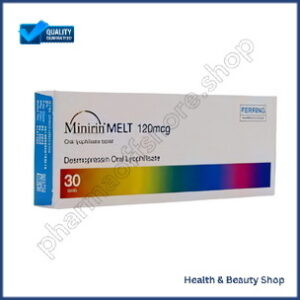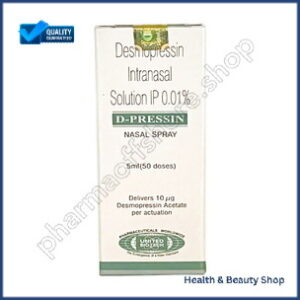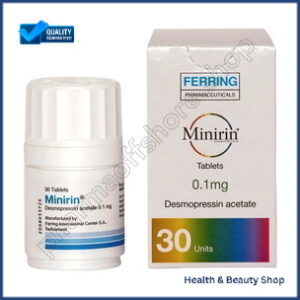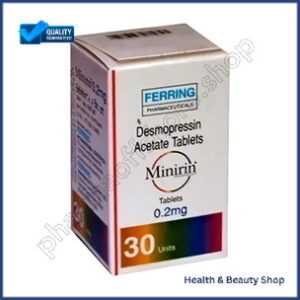ADDICTION
ALCOHOL DEPENDENCE
QUIT SMOKING
ALLERGY
ANTI FUNGAL
FUNGAL INFECTION
FUNGAL NAIL INFECTIONS
ANTI-REJECTION DRUGS
ANTI WORM
ANTIBIOTIC
BACTERIAL INFECTIONS
ARTHRITIS
GOUT
OSTEOARTHRITIS
RHEUMATOID ARTHRITIS
BLOOD
LOW PLATELET COUNT
THROMBOPHLEBITIS
VARICOSE VEINS
COLON
ANAL FISSURE
PILES
ULCERATIVE COLITIS
DIABETES CARE
DIABETES INSIPIDUS
DIABETES TYPE
DIABETIC FOOT ULCERS
GLUCOSE MONITOR
EYES/EAR CARE
DRY EYES
EYE CARE
EYE EXAMINATION
EYE INFECTION
EYE LASHES
EYE PAIN
GLAUCOMA
OCULAR HYPERTENSION
UVEITIS
FEVER CARE
MALARIA
RHEUMATIC FEVER
TYPHOID FEVER
GASTROINTESTINAL
ACIDITY
CONSTIPATION
CROHN'S DISEASE
DIARRHOEA
GALLBLADDER STONES
INTESTINAL ULCERS
IRRITABLE BOWEL SYNDROME
MOTION SICKNESS
NAUSEA
Minirin Nasal Spray (Desmopressin)
| Active Ingredient (Generic Name): | Desmopressin |
|---|---|
| Indication: | Diabetes insipidus, Bed-wetting |
| Manufacturer: | Ferring Pharmaceuticals |
| Packaging: | 2.5 ml in one packet |
From: $31.00
Minirin Nasal Spray (Desmopressin) helps regulate water balance and treats conditions like diabetes insipidus, bedwetting, and Von Willebrand disease by enhancing factor release. Follow prescribed dosage, clear nasal passages, and avoid exceeding recommended dose. Consider medical history for personalized treatment. Maintain balanced diet, monitor fluid intake, and avoid salty foods. Side effects may include nasal discomfort, headache, nausea, and nosebleeds. Store at room temperature and dispose properly. Seek immediate medical help for severe symptoms. Learn more about appropriate use, precautions, dietary instructions, and emergency information for Minirin Nasal Spray to guarantee safe and effective treatment.
Begin your journey with Minirin Nasal Spray to effectively manage your condition. This medication contains desmopressin, a synthetic form of a natural hormone that helps regulate your body’s water balance. By using Minirin Nasal Spray as prescribed by your healthcare provider, you can improve symptoms related to excessive thirst and urination.
When starting Minirin Nasal Spray, it’s important to carefully follow the instructions provided by your doctor. This includes the correct dosage, frequency of use, and any specific guidelines for administration. Make sure to prime the pump before the first use and guarantee proper storage of the medication to maintain its effectiveness.
Monitoring your response to Minirin Nasal Spray is essential for managing your condition effectively. Keep track of any changes in your symptoms, side effects, or overall well-being, and communicate these findings with your healthcare provider. By working closely with your doctor and staying compliant with the prescribed regimen, you can maximize the benefits of Minirin Nasal Spray in addressing your condition.
Why is this medication prescribed?
To manage certain conditions effectively, healthcare providers prescribe Minirin Nasal Spray containing desmopressin, a synthetic hormone aiding in regulating the body’s water balance. Desmopressin is commonly prescribed to treat conditions like diabetes insipidus, a disorder that leads to excessive urination and extreme thirst due to the kidneys producing an abnormally large volume of dilute urine. It is also used in cases of bedwetting (nocturnal enuresis) in children and adults, where it helps reduce the amount of urine produced during the night, leading to fewer incidents of bedwetting. Additionally, Minirin Nasal Spray is prescribed to manage certain types of von Willebrand disease, a bleeding disorder that affects the blood’s ability to clot. By enhancing the release of von Willebrand factor and factor VIII in the blood, desmopressin helps control bleeding episodes in individuals with this condition. Overall, desmopressin in Minirin Nasal Spray form is vital in addressing these specific medical conditions effectively.
How should this medicine be used?
When using Minirin Nasal Spray, make sure to follow the prescribed dosage and administration instructions provided by your healthcare provider. Typically, the recommended dose for adults with diabetes insipidus is 10-40 micrograms per day, divided into two or three doses. For children, the dosage is usually lower and tailored to their specific needs.
To use the nasal spray, first, gently blow your nose to clear the nasal passages. Shake the bottle well before each use. Remove the protective cap and hold the bottle upright. Tilt your head slightly forward and insert the tip of the spray bottle into one nostril. Press down on the pump to release the spray while inhaling gently through your nose. Repeat the process for the other nostril if instructed to do so.
Remember not to exceed the prescribed dose, as it can lead to complications. If you miss a dose, take it as soon as you remember, unless it’s almost time for the next dose. In that case, skip the missed dose and continue with your regular schedule.
Other uses for this medicine
If your healthcare provider prescribes Minirin Nasal Spray, it may be for conditions beyond diabetes insipidus. This medication can also be used to treat bed-wetting in children over 6 years old. By helping the kidneys concentrate urine, Minirin Nasal Spray can reduce the frequency of bed-wetting episodes. Additionally, it is sometimes prescribed to manage excessive thirst and urination caused by certain conditions like head trauma or surgery in the pituitary gland region.
Another potential use of Minirin Nasal Spray is in the treatment of nocturia, a condition characterized by waking up during the night to urinate. By regulating the body’s fluid balance, this medication can help decrease the number of nighttime awakenings for urination. However, carefully following your healthcare provider’s instructions is crucial when using Minirin Nasal Spray for these conditions, as the dosage and frequency may vary based on individual needs and medical history. Always consult with your healthcare provider before using Minirin Nasal Spray for any condition other than what it was prescribed for.
What special precautions should I follow?
Before using Minirin Nasal Spray, it’s important to verify your medical history to confirm it is safe for you. Make sure to notify your healthcare provider of any underlying conditions or medications you are currently taking. Following these precautions can help prevent any potential adverse effects and ensure the safe and effective use of the medication.
Check Medical History
Examine your medical history carefully before using Minirin Nasal Spray to identify any special precautions necessary for your specific situation. It is important to take into account the following points:
- Previous Medical Conditions: Note any history of kidney disease or hyponatremia.
- Allergies: Be mindful of any allergies to desmopressin or other medications.
- Current Medications: Inform your healthcare provider about all medications, including over-the-counter and herbal supplements.
- Pregnancy/Breastfeeding: Consult your doctor if you are pregnant, planning to become pregnant, or breastfeeding.
- Fluid Intake: Monitor your fluid intake as advised by your healthcare provider to prevent water intoxication.
What special dietary instructions should I follow?
For optimal results with Minirin Nasal Spray (Desmopressin), it is essential to follow specific dietary instructions. When using this medication, it is vital to maintain a balanced diet and sufficient fluid intake. Make sure you are consuming foods rich in water content, such as fruits and vegetables, to help maintain hydration levels. Avoid excessive consumption of salty foods, as sodium can impact the body’s water balance and potentially interfere with the medication’s effectiveness.
Incorporate foods high in potassium, like bananas, oranges, and potatoes, as potassium helps regulate fluid balance in the body. Additionally, monitor your caffeine intake, as it can increase urine production and counteract the effects of Minirin Nasal Spray. Remember to follow any dietary guidelines provided by your healthcare provider to optimize the medication’s benefits.
What should I do if I forget a dose?
If you forget a dose of Minirin Nasal Spray (Desmopressin), promptly take it as soon as you remember, unless it is close to the time for your next scheduled dose. In case you realize you missed a dose near the time for your next administration, skip the missed dose and continue with your regular dosing schedule. Do not double up on doses to make up for the missed one. It is important to maintain a consistent dosing schedule to guarantee the effectiveness of the medication. If you have any concerns or questions about missed doses or how to proceed, contact your healthcare provider for guidance. Keeping a routine and setting reminders can help you remember to take your medication as prescribed. Consistency in taking Minirin Nasal Spray is essential for managing your condition effectively.
What side effects can this medication cause?
Minirin Nasal Spray (Desmopressin) can cause various side effects that require close monitoring. Some of these side effects can be serious, so it is important to be vigilant. If you notice any concerning symptoms, it is essential to contact your doctor immediately.
Monitor Persistent Adverse Reactions Closely
Closely monitoring for potential adverse reactions is crucial when using Minirin Nasal Spray (Desmopressin) as it can cause various side effects. Some common side effects to watch for include:
- Nasal discomfort or irritation
- Headache
- Nausea
- Runny or stuffy nose
- Nosebleeds
If you notice any of these side effects, it’s important to inform your healthcare provider. Proper monitoring can help manage these effects and guarantee the safe use of Minirin Nasal Spray. Remember to follow the prescribed dosage and administration instructions to minimize the risk of experiencing these adverse reactions.
Some side effects can be serious. If you experience any of the following symptoms, call your doctor immediately:
When experiencing certain symptoms while using Minirin Nasal Spray (Desmopressin), immediate medical attention may be necessary. Some side effects can be serious. If you experience any of the following symptoms, call your doctor immediately:
- Severe headache
- Confusion
- Nausea or vomiting
- Swelling of the arms or legs
- Difficulty breathing
These symptoms could indicate a potentially serious reaction to the medication and should not be neglected. It is important to seek prompt medical help to address these side effects and guarantee your well-being. Your doctor will be able to assess the situation and provide appropriate guidance or treatment to manage these symptoms effectively.
What should I know about the storage and disposal of this medication?
To maintain the effectiveness of Minirin Nasal Spray (Desmopressin), store it in a cool, dry place away from direct sunlight. Keep the medication at room temperature between 68-77 degrees Fahrenheit (20-25 degrees Celsius). Avoid storing it in the bathroom or kitchen where moisture levels can fluctuate. Make sure the cap is tightly closed when not in use to guarantee contamination prevention.
When it comes to disposing of Minirin Nasal Spray, do not flush it down the toilet or pour it down the drain unless instructed to do so. Check with your pharmacist or local waste disposal company on how to properly dispose of unused or expired medication. It is crucial to follow their guidelines to ensure the safe and environmentally friendly disposal of the nasal spray.
If you have any questions regarding the storage or disposal of Minirin Nasal Spray, consult your healthcare provider or pharmacist for further guidance. Proper storage and disposal help uphold the medication’s effectiveness and prevent any potential harm.
In case of an emergency/overdose
In the event of an emergency or overdose with Minirin Nasal Spray (Desmopressin), immediately seek medical assistance. An overdose of Desmopressin can lead to symptoms like confusion, drowsiness, headache, nausea, vomiting, and in severe cases, seizures or water intoxication. If you suspect an overdose or experience any of these symptoms, do not delay in seeking help. Contact your local poison control center at 1-800-222-1222 or go to the nearest emergency room. It is important to provide healthcare providers with information about the amount of medication taken and the time of ingestion. Treatment for an overdose may involve supportive care, monitoring of electrolyte levels, and managing symptoms as needed. Do not try to induce vomiting unless instructed by medical professionals. Prompt medical attention is vital in the case of an overdose to prevent any potential complications and guarantee proper management of the situation.
What other information should I know?
Make sure you inform your healthcare provider about any other medications or medical conditions you have before using Minirin Nasal Spray (Desmopressin). This is vital to avoid any potential interactions that could affect the effectiveness or safety of the medication. Your healthcare provider needs to be notified about any allergies you have, especially if they are related to desmopressin or any other components of the nasal spray. It is important to follow the dosage instructions provided by your healthcare provider or as indicated on the prescription label. Do not exceed the recommended dose, as this can lead to serious side effects. Keep track of how often you use the nasal spray and consult your healthcare provider if you have any concerns or questions. Store the medication properly at room temperature away from moisture and heat. Finally, do not share your Minirin Nasal Spray with others, even if they have similar symptoms, as it may not be suitable for their condition.
Brand names
What are the brand names associated with Minirin Nasal Spray (Desmopressin)? Minirin Nasal Spray, the medication containing desmopressin, is known by various brand names worldwide. Below is a table displaying some of the brand names under which Minirin Nasal Spray may be marketed:
| Brand Name | Active Ingredient |
|---|---|
| Minirin | Desmopressin |
| DDAVP | Desmopressin |
| Noctiva | Desmopressin |
Minirin Nasal Spray, also commonly referred to as DDAVP, and Noctiva, contains the active ingredient desmopressin. These brand names are used interchangeably in different regions and may have varying availability depending on the country. It is essential to consult with a healthcare provider or pharmacist to make sure you are using the correct brand of desmopressin nasal spray prescribed to you.
Purchase Locations and Availability
To find Minirin Nasal Spray (Desmopressin) and its various brand names like Minirin, DDAVP, and Noctiva, discover where they are available for purchase. Minirin Nasal Spray is typically available for purchase at pharmacies with a prescription from your healthcare provider. You can also check with online pharmacies or websites authorized to sell prescription medications. It’s important to confirm that you are purchasing from a reputable source to guarantee the quality and authenticity of the product. Some specialty medical supply stores may also carry Minirin Nasal Spray. Additionally, you can inquire at hospitals or clinics where the medication may be available for purchase or administration. Keep in mind that availability may vary based on your location and local regulations. Always consult with a healthcare professional before purchasing or using Minirin Nasal Spray to ensure it is the right medication for your condition and that you are using it correctly.
To summarise
Summarizing the information provided can help in better understanding the availability of Minirin Nasal Spray (Desmopressin) for purchase. Minirin Nasal Spray, containing the active ingredient Desmopressin, is commonly used to treat conditions like diabetes insipidus, bedwetting, and nocturia. This medication works by reducing the amount of urine produced by the kidneys, helping to control excessive urination. It is important to follow the dosage instructions provided by a healthcare professional to guarantee safe and effective use. When considering purchasing Minirin Nasal Spray, it is essential to note that availability may vary depending on your location and the regulations governing the sale of prescription medications in your area. Hence, consulting with a healthcare provider or pharmacist is recommended to determine the availability of Minirin Nasal Spray and to obtain a valid prescription if needed. Understanding the availability of Minirin Nasal Spray for purchase can help you make informed decisions regarding its acquisition and use for managing specific medical conditions.







